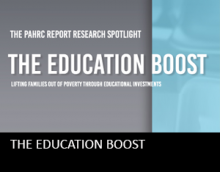Found 26 resources.
0
0
0

Navigating college as a first-generation college student can feel like making your way through a maze with no map, filled with “learn as you go” lessons, and “wow, I wish I knew this then.” When you combine it with being low-income, homeless, and/or food insecure, it can feel like you’re navigating the same maze blindfolded, on a tightrope, balancing multiple responsibilities. It should not be like this.
Topics: Low-income, Post-secondary, Stability, Youth
 Shared by Housing Is
on May 29, 2019
Shared by Housing Is
on May 29, 2019 0
0
0

That’s according to the fourth and largest survey of college students’ ability to afford food and housing
Topics: Food insecurity, Low-income, Nutrition, Post-secondary, Research, Youth
 Shared by Housing Is
on May 6, 2019
Shared by Housing Is
on May 6, 2019 0
0
0
Education Design Lab taps four large community colleges in an ambitious effort to raise single-mother completion rate 30 percent at each institution by 2024.
Topics: Dual-generation, Early childhood, Family engagement, Low-income, Metrics, Post-secondary
0
0
0

Founded in 1995 as Project Women, Family Scholar House (FSH) provides comprehensive, holistic services for disadvantaged single parents, their children, and foster alumni. The nonprofit seeks to end the cycle of poverty and transform communities by empowering families and youth to succeed in education and life-long self-sufficiency. FSH provides supportive housing, educational programming, and participant advocacy to help families gain independence.
Topics: Dual-generation, Early childhood, Education, Homelessness, Housing, Low-income, Partnerships, Place-based, Post-secondary, South, Stability
0
0
0
Now colleges and universities themselves are pulling together more permanent solutions, often in collaboration with local housing authorities and non-profit partners. In some cases, colleges and universities are trying to avoid losing enrollment; not surprisingly, students in unstable living environments or who can't afford food have poorer physical health, symptoms of depression and psychological stress, and are more likely to drop out, research shows.
Topics: CLPHA, Homelessness, Housing, Low-income, Partnerships, Post-secondary, West Coast
0
0
0

Lack of transparency about SNAP benefits leaves students confused, unable to take advantage of resources
Topics: Food insecurity, Low-income, Nutrition, Post-secondary, Research, Youth
 Shared by Housing Is
on Feb 11, 2019
Shared by Housing Is
on Feb 11, 2019 0
0
0

Unlike elementary and secondary school students, whose families can get some support from things like federal free breakfast and lunch programs, for college students much of that assistance dries up.
Topics: Education, Food insecurity, Homelessness, Housing, Low-income, Post-secondary, Youth
 Shared by Housing Is
on Jan 28, 2019
Shared by Housing Is
on Jan 28, 2019 0
0
0
On Wednesday afternoon, Durant — back home as Golden State prepared to play the Washington Wizards on Thursday night — made his way southeast, back to the old neighborhood, to appear at the grand opening of College Track at the Durant Center, whose location the Suitland native selected largely because it’s next door to that familiar McDonald’s. The after-school program, whose inaugural class includes 69 students largely from low-income families, provides study space and guidance not only through college enrollment but through graduation.
Topics: East Coast, Funding, Low-income, Out-of-school time, Place-based, Post-secondary, Youth
0
0
0

A new government report highlights just how pervasive the problem is.
Topics: Food insecurity, Low-income, Nutrition, Post-secondary, Research
0
0
0
A guide for youths who are or were homeless, or are at risk of experiencing homelessness
Topics: Education, Homelessness, Housing, Low-income, Post-secondary
0
0
0
ASAP is a comprehensive program that provides students with up to three years of financial and academic support and other support services to address multiple barriers to student success, with the goal of helping more students graduate within three years. MDRC’s random assignment evaluation of CUNY ASAP found that after three years, 40 percent of ASAP students graduated compared with just 22 percent of control group students. After six years, ASAP students continued to outperform the control group, with 51 percent of the program group earning degrees compared with 41 percent of the control...
Topics: Education, Low-income, Midwest, Post-secondary, Research, Youth
0
0
0
Three Ohio community colleges have successfully adapted the City University of New York’s innovative Accelerated Study in Associate Programs (ASAP), according to findings released today at Lorain County Community College in Elyria, Ohio.
Topics: Cost effectiveness, Low-income, Post-secondary, Youth
0
0
0

A mailer sent to low-income students with that promise led to a major jump in enrollment at the University of Michigan, according to a new study.
Topics: Education, Funding, Low-income, Post-secondary, Research, Youth
 Shared by Housing Is
on Dec 11, 2018
Shared by Housing Is
on Dec 11, 2018 0
0
0

Many youth experiencing homelessness report avoiding shelters because they don’t feel safe there or can’t relate to the older adults, but they often don’t have another option. It’s a problem that many jurisdictions are working to correct, understanding that although homeless youth and homeless adults have similar needs, reaching these young people may require different spaces and different strategies.
Topics: East Coast, Education, Homelessness, Housing, Low-income, Metrics, Post-secondary, Safety, Youth
0
0
0

Some community colleges have found innovative partnerships with their public housing authorities may help combat student homelessness.
Topics: Asset building, CLPHA, Education, Homelessness, Housing, Low-income, Midwest, Pacific Northwest, Partnerships, Post-secondary, Stability, Workforce development
0
0
0

An organization is using the influence that teenagers have on their contemporaries to help more students from low-income families gain college admission and student aid.
Topics: Education, Low-income, Mental health, Post-secondary, Stability, Youth
0
0
0
Students have around 60 programs at their disposal, from advanced manufacturing to emergency medical response.
Topics: East Coast, Education, Food insecurity, Health, Low-income, Post-secondary, Youth
0
0
0

An estimated half of all college students struggle with food insecurity, even at elite flagship universities like the University of California, Berkeley, and selective private schools like Northwestern University. Former foster youth, L.G.B.T. students and students of color are at substantially increased risk. Food insecurity is strongly linked to lower graduation rates.
Topics: Low-income, Post-secondary, Youth
0
0
0
Recognizing the layers to developing a health and housing partnership, this Literature Review and Resource Bank is intended to provide background and data resources that can be used in grant applications or in conversations with potential funders in the effort to foster new health and supportive housing partnerships.
Topics: Cost effectiveness, Criminal justice, Data sharing, Dual-eligibles, Funding, Health, Homelessness, Housing, Low-income, Medicaid / Medicare, Mental health, Partnerships, Post-secondary, Preventative care, Research, Seniors, Substance abuse, Supportive housing, Youth
 Shared by Housing Is
on Jul 13, 2018
Shared by Housing Is
on Jul 13, 2018 0
0
0
Topics: Dual-generation, Education, Family engagement, Low-income, Mobility, Post-secondary, Youth
 Shared by Housing Is
on Jul 11, 2018
Shared by Housing Is
on Jul 11, 2018 0
0
0

Graduation rates in Arkansas have improved for all racial groups under this program
Topics: Cost effectiveness, Dual-generation, Education, Family engagement, Legislation & Policy, Low-income, Post-secondary, Racial inequalities, South, Youth
 Shared by Housing Is
on Jul 5, 2018
Shared by Housing Is
on Jul 5, 2018 0
0
0
Topics: Community development, Education, Family engagement, Low-income, Midwest, Post-secondary, Research, Workforce development, Youth
 Shared by Housing Is
on Jul 5, 2018
Shared by Housing Is
on Jul 5, 2018 0
1
1
Researchers have shown — and teachers know — that schoolchildren exposed to neighborhood violence can have a tougher time learning, experiencing more stress and depression than their peers growing up in safe neighborhoods. But a Johns Hopkins University sociologist discovered that the consequences of neighborhood violence reach further than previously known, even spilling over to students who come from safe neighborhoods. Using crime and student data from Chicago, Julia Burdick-Will linked exposure to neighborhood violence to a drop in test scores, an effect that extended to students coming...
Topics: Attendance, Child welfare, Community development, Depression, Education, Health, Low-income, Mental health, Midwest, Out-of-school time, Post-secondary, Racial inequalities, Research, Youth
0
0
0

Poor children don't struggle in school because of their parents. They struggle because of poverty.
Topics: Attendance, Child welfare, Dual-generation, Early childhood, Education, Family engagement, Food insecurity, Grade-level proficiency, Housing, Legislation & Policy, Literacy, Low-income, Out-of-school time, Post-secondary, Racial inequalities, Research, School-readiness, Youth
0
0
0

Topics: Education, Housing, Low-income, Post-secondary, Research, Workforce development
 Shared by Keely Stater
on Jun 6, 2017
Shared by Keely Stater
on Jun 6, 2017 
